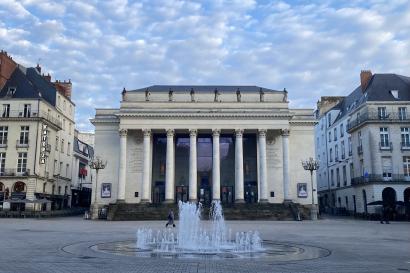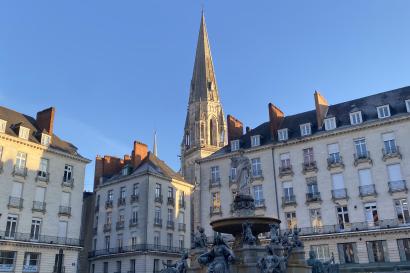Every time you enter a new culture, there are things that you will have to get used to, especially if you live there for a long time. These adjustments can be to little things, such as making sure to say Bonjour every time you enter a store or a restaurant, or not smiling at people as you walk through the streets. But, these adjustments can also be to bigger events and ways of life. For me, the biggest adjustment to life in France was getting used to the constant protests, also known as manifestations. Manifestations in France are a critical part of the culture. After the French Revolution, they became increasingly more common to enact change in the government. And, contrary to protests in the U.S., they are often quicker to enact change.
Manifestations can range from small groups of people to very large groups of people. Things can sometimes get violent and police sometimes have to use tear gas to control crowds.
During the first few weeks of my stay in Nantes, there was a manifestation by the agricultural workers all around France for better wages and working conditions. As the Loire-Atlantique is a largely agricultural département in France, there were a lot of people in the region supporting the movement. When the protestors took to Nantes, they used tractors to block Tram Line 1, cutting access to the University. While I didn’t see this in person myself, several of my friends couldn’t get to their classes at the university or had to walk from where the line was cut forty minutes back to the IES Abroad Center. They also witnessed a large group of people getting tear gassed. While the IES Abroad staff in Nantes warned us about this and told us to avoid intersecting the protests if possible, it still took us all by surprise. The agricultural protest was definitely the biggest one of the semester, as it was something not unique to Nantes. In Paris, for example, the tractors blocked off part of the boulevard périphérique, which circles the entire city.
Throughout the semester, it felt as if there was at least one protest every three weeks. I got tired of the manifestation culture quickly, as it disrupted transit lines and made it really hard to get to and from class. One of the great things about the IES Abroad Nantes program is that you can take courses at the IES Abroad Center downtown, but also at Nantes University, which is about 20 minutes by tram from downtown. There were some days where I only had class at IES Abroad and some where I had classes at both IES Abroad and the university. This made for some busy days where I relied heavily on the public transportation to function, and to function well.
While the manifestation culture was one of the more difficult aspects of life in France to adjust to, I feel that despite some very frustrating days, it did not impede on the overall good experience I had in Nantes. Since it’s such a part of life in France, professors wouldn’t fault you if you couldn’t get to class since the transit lines were cut. People adjusted accordingly, and the phrase I would hear a lot is « ah c’est bien la France. » A similar translation would be, well that’s France for you.
The more time I spent in the country, the more I adopted this slogan. And, while I still got very annoyed at times with these cultural differences, I look back on those experiences now and laugh. This semester in Nantes truly gave me the real French experience, in more ways than one.

Grace Heaton
Hi! My name is Grace Heaton. I am thrilled to be studying abroad in Nantes in Spring 2024. I am a junior at Duquesne in Pittsburgh, PA studying Marketing, French, and German. I enjoy traveling, learning languages, and adventuring with friends.







